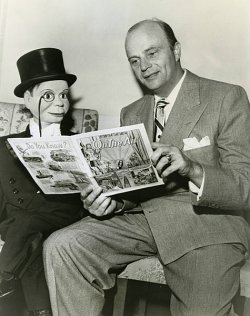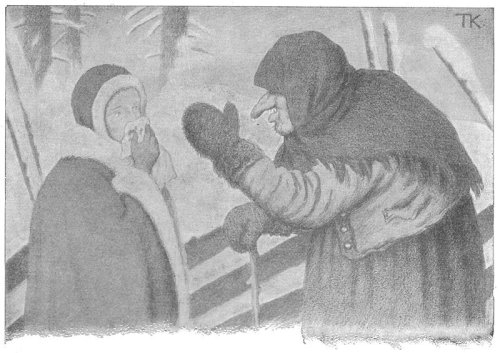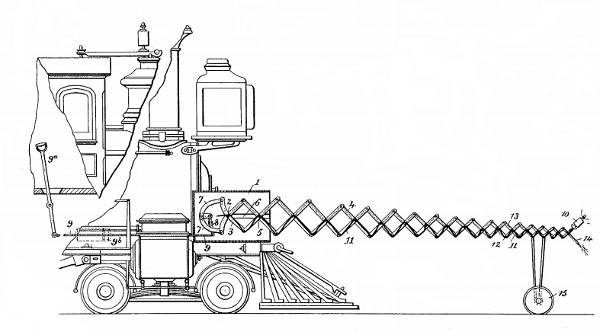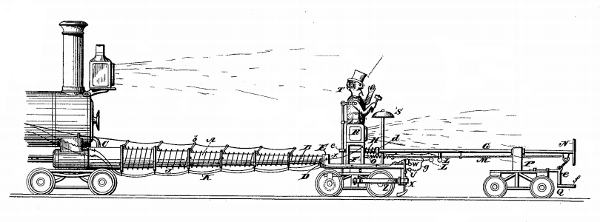
In 1938 Charlie McCarthy received an honorary degree from Northwestern University — as “master of innuendo and the snappy comeback.”

In 1938 Charlie McCarthy received an honorary degree from Northwestern University — as “master of innuendo and the snappy comeback.”

He killed the noble Mudjokivis.
Of the skin he made him mittens,
Made them with the fur side inside,
Made them with the skin side outside.
He, to get the warm side inside,
Put the inside skin side outside;
He, to get the cold side outside,
Put the warm side fur side inside.
That’s why he put the fur side inside,
Why he put the skin side outside,
Why he turned them inside outside.
— George A. Strong, “The Modern Hiawatha,” in The Home Book of Verse, 1918
Ofttimes when I put on my gloves,
I wonder if I’m sane,
For when I put the right one on,
The right seems to remain
To be put on–that is, ‘t is left;
Yet if the left I don,
The other one is left, and then
I have the right one on.
But still I have the left on right;
The right one, though, is left
To go right on the left right hand
All right, if I am deft.
— Ray Clarke Rose, “Simple English,” in Wallace Rice, A Book of American Humorous Verse, 1903
“What can be more similar in every respect and in every part more alike to my hand and to my ear, than their images in a mirror?” wrote Kant in 1783. “And yet I cannot put such a hand as is seen in the glass in the place of its archetype; for if this is a right hand, that in the glass is a left one, and the image or reflection of the right ear is a left one which never can serve as a substitute for the other. There are in this case no internal differences which our understanding could determine by thinking alone. Yet the differences are internal as the senses teach, for, notwithstanding their complete equality and similarity, the left hand cannot be enclosed in the same bounds as the right one (they are not congruent); the glove of one hand cannot be used for the other.”

apricity
n. the warmth of the sun in winter
“A strange and lovely word.” — Ammon Shea, Reading the OED, 2009

In 1917, railroad engineers at Nenana, Alaska, held a contest to guess when the Tanana River would break up. The winner won $800.
That contest has grown into an annual fundraising event. For $2.50 any Alaskan can enter; sometime in April or May a tripod will founder in the melting ice and stop a clock, and the guess that proves most accurate will win a prize. Last year the prize amounted to $279,030; in all, more than $11 million has been paid out during the contest’s 94 years.
The National Snow and Ice Data Center monitors the breakup dates as one measure of climate change in the region.

The loneliest animal in the world is George, a 100-year-old Pinta Island tortoise who is thought to be the last of his subspecies. When goats overran their island in the Galápagos, George’s companions died out, and no one has discovered a Pinta female, despite a $10,000 reward. If none is found in time for George to breed, he’ll be the last of his kind.
The second loneliest animal is Khanzir, “the only pig in Afghanistan,” where pork products are illegal. Khanzir, whose name means “pig,” was one of a pair of white pigs that China donated to the Kabul zoo in 2002, but his mate has died.
See Spectacularly Bad Driving.
03/09/2018 UPDATE: George passed away in 2012, marking the extinction of the Pinta species.

On a television show, Eddie Fisher complained to George S. Kaufman that women refused to date him because he looked so young. Kaufman considered this and replied:
“Mr. Fisher, on Mount Wilson there is a telescope that can magnify the most distant stars up to 24 times the magnification of any previous telescope. This remarkable instrument was unsurpassed until the construction of the Mount Palomar telescope, an even more remarkable instrument of magnification. Owing to advances and improvements in optical technology, it is capable of magnifying the stars to four times the magnification and resolution of the Mount Wilson telescope. Mr. Fisher, if you could somehow put the Mount Wilson telescope inside the Mount Palomar telescope, you still wouldn’t be able to detect my interest in your problem.”
As railroads were claiming the American West in the 1880s, they ran into a problem — stray cattle and horses kept wandering onto the tracks. What to do?
In 1883 La Fayette Willson Page of Tennessee suggested a spray attachment that would direct a stream of water from the engine’s boiler:

In 1885 Mississippi inventor William Bell proposed a Dr.-Seuss-like set of tongs that would extend a whistle and a spray nozzle closer to the livestock:

And in 1888 Jack William James, also of Tennessee, went full-on crazy and suggested a flatcar mounted with a dummy that would “throw up both hands at each revolution of the wheel and strike [a] gong with a hammer”:

I desperately wish this had caught on. How stubborn are Tennessee cows?

Weirton, W.Va., is the only town in the United States that borders two different states on opposite sides.
The town borders Ohio directly on the west and Pennsylvania on the east.

Upend Congress and pour its members onto Constitution Avenue. Each member has up to three enemies. Prove that it’s possible to pack the 535 members back into the House and Senate in such a way that none of them has more than one enemy in his chamber. (Enmity is always mutual — I am my enemy’s enemy — and the chambers need not retain their former sizes.)